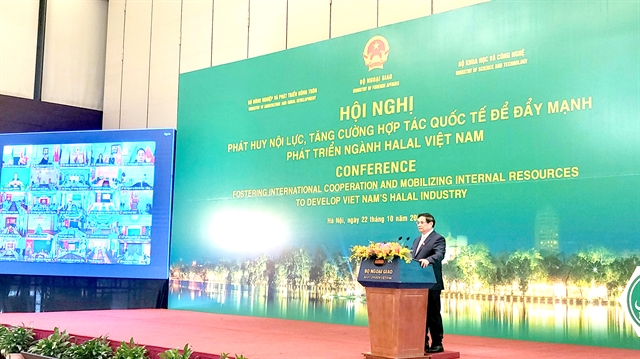 Economy
Economy

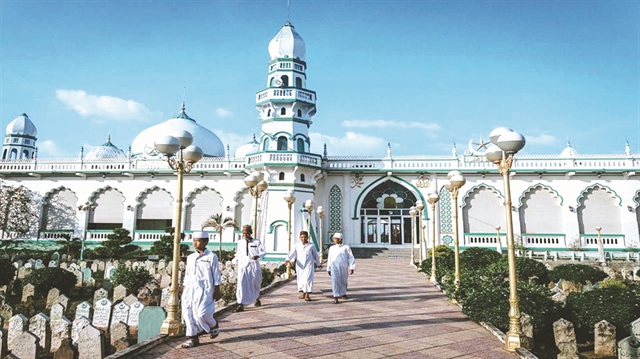 |
| RELIGIOUS GROUNDS: The Jamiul Azhar mosque in the southern province of An Giang, the biggest Muslim mosque in Việt Nam. Photo btgcp.gov.vn |
by Bảo Hoa
Prime Minister Phạm Minh Chính is set to return this weekend from an official visit to the United Arab Emirates (UAE), Qatar and Saudi Arabia.
His visit, the first by a Vietnamese Prime Minister to the UAE and Qatar in 15 years, and the first by a Vietnamese leader to Saudi Arabia since establishing diplomatic relations 25 years ago, signals Việt Nam’s heightened interest in strengthening ties with these pivotal Middle Eastern nations.
These deepened connections are expected to unlock various opportunities for Việt Nam, particularly in economic cooperation and cultural exchange. One promising area is the development of a domestic halal industry catering to Muslim consumers—a sector the Vietnamese Government has actively promoted in recent years.
Efforts have been made to bring Vietnamese food products up to halal standards to facilitate exports to Islamic countries, while halal tourism is emerging as a new market with substantial growth potential.
“Halal”, an Arabic term meaning “permissible” or “lawful”, defines practices and products that align with Islamic law.
According to İhsan Övüt, Secretary General of the Standards and Metrology Institute for Islamic Countries, halal standards represent a significant opportunity for Việt Nam, especially within the tourism sector.
“As Việt Nam continues to grow as one of Asia's most dynamic economies, the need for tourism to reflect the diverse expectations of international visitors has become increasingly clear,” he said.
“The halal industry offers a considerable avenue for Việt Nam to broaden its tourist base, particularly from Muslim-majority countries, presenting itself as a welcoming destination that respects cultural and religious needs.”
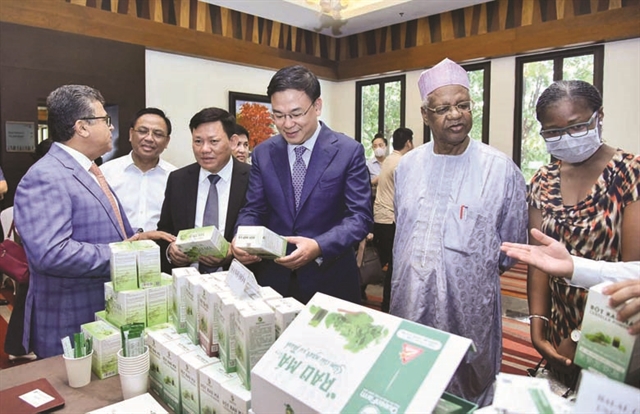 |
| FOOD FAIR: Vietnamese halal-certified food products are on display at an international conference on developing the Halal industry in Hà Nội in June 2022. Photo dangcongsan.vn |
The Global Muslim Travel Index highlights the halal tourism market as vibrant, with a rising demand from nearly two billion Muslims worldwide, representing about one-fourth of the global population. With the global Muslim population projected to reach 2.2 billion by 2030, spending from this tourism market is expected to increase, potentially reaching US$341.1 billion per year.
Recognising this trend, Việt Nam has hosted multiple conferences and seminars over the past two years to promote tourism investment between the Middle East and South Asia, and to explore ways to enhance halal tourism in promising locations such as Quảng Ninh, Đà Nẵng, Quảng Nam, and Kiên Giang.
Statistics from the Việt Nam National Administration for Tourism (VNAT) indicate that tourist numbers from Muslim-majority nations—particularly from India—have grown in recent years. The trend is also evident among visitors from Southeast Asian countries with large Muslim populations, such as Singapore, Malaysia and Indonesia.
VNAT Deputy Director Hà Văn Siêu believes that the halal market holds great promise for Việt Nam’s tourism industry, referring to it as a “gold mine” with the potential to create breakthroughs.
“The market for Halal-certified tourism services could represent a new chapter in Việt Nam’s tourism,” he told Hà Nội Mới (New Hà Nội ) newspaper.
Increasing halal awareness
Despite the progress made, experts say that Việt Nam’s halal tourism market requires further development to reach its potential.
Zafer Gedikli, president of the World Halal Council, believes Việt Nam could become a highly attractive destination for Muslim tourists if halal awareness is raised among service providers. Gedikli noted that enhancing knowledge about halal standards in hotels and restaurants would make Việt Nam more appealing to Muslim travellers.
“The primary barrier to Việt Nam’s halal market growth is the widespread lack of awareness among entrepreneurs about halal requirements,” Gedikli explained.
“Many business owners and small enterprises are not well-acquainted with halal compliance, particularly in areas such as ingredient sourcing, processing, and packaging, which prevents them from meeting the rigorous standards necessary for certification.”
Gedikli pointed out that simple ingredients can often pose challenges. “For instance, adding a few drops of wine to a sauce may seem normal in Việt Nam, but it renders the dish unsuitable for Muslims,” he said.
"Similarly, while Muslims consume meat like beef, chicken, and lamb, these must be slaughtered according to Islamic rites. Without this, they are not permissible."
In Hà Nội’s bustling Old Quarter, Vũ Thị Khánh Chi has made strides in halal-friendly offerings. She operates three food stations that serve Vietnamese cuisine prepared in halal style, which have gained popularity among Muslim tourists and local residents alike.
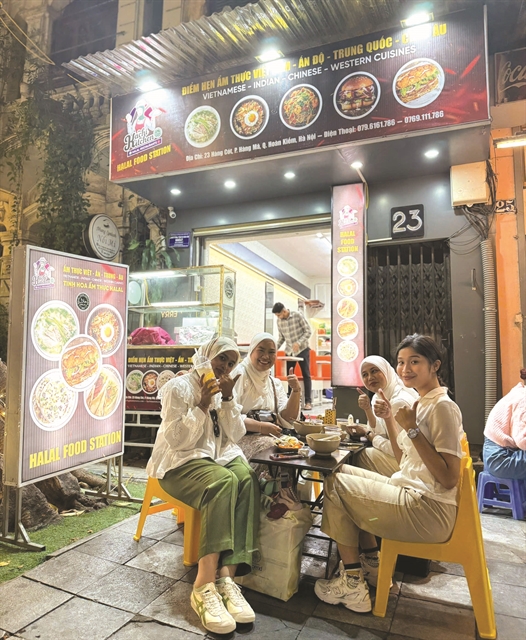 |
| DINNER TIME: Muslim tourists dine at Vũ Thị Khánh Chi's halal food shop at 23 Hàng Cót Street in Hà Nội's Old Quarter. — Photo courtesy of Kachi Kitchen Halal |
“Learning about halal standards helped me understand why they’re so important for Muslim customers, who strictly follow these rules,” Chi said.
She described how customers transiting through Nội Bài Airport frequently visit her outlets, paying high cab fares just to find a halal-certified bowl of phở or bánh mì.
“For business owners wanting to enter the halal market, there are courses and certification centres in Việt Nam that can provide halal certification,” she said, expressing confidence in the market’s growth prospects for both Muslim and non-Muslim clientele.
Fostering tourism initiatives
National Halal Vietnam (VNH), a company that helps businesses establish halal practices and obtain certification from the International Halal Accreditation (IHA) organisation, has taken steps to assist Vietnamese businesses, including tourism enterprises, restaurants and hotels, in catering to Muslim guests.
A recent success story is the Sapa Charm Hotel in Lào Cai Province, which began collaborating with VNH in September 2023 to provide halal services.
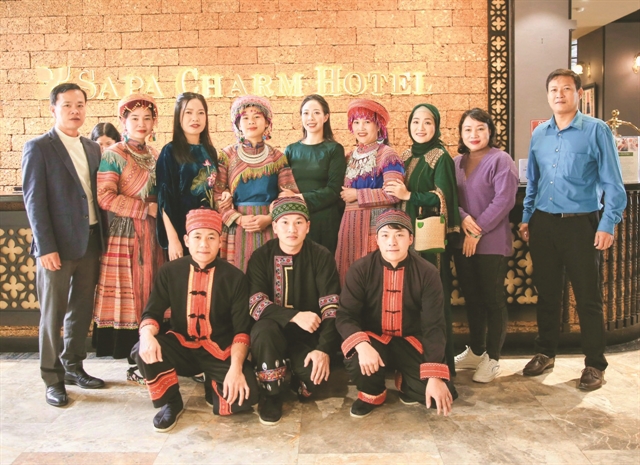 |
| WARM WELCOME: Staff at Sapa Charm Hotel with Muslim visitors. — Photo dulichvn.net.vn |
To create a halal-compliant environment, VNH worked with Sapa Charm to train hotel staff and managers in essential service protocols for Muslim guests, including the specifics of halal food and appropriate guest interaction.
The hotel adapted 25 rooms, added a communal prayer room available 24/7, and designated a dining area and kitchen exclusively for halal meals. Other tailored amenities included dedicated walkways, lifts, and bilingual signs in English and Arabic to enhance accessibility and comfort for Muslim guests.
Trần Văn Tân Cương, director of VNH, underscored the importance of cultural understanding for the growth of halal tourism. “Attracting Muslim tourists requires an awareness of and respect for their unique cultural and religious requirements,” he said.
“Restaurants and tourist sites in Việt Nam must focus on educating their staff about these differences while providing packages that adhere to halal principles, including sustainability and environmental friendliness. An inclusive and respectful environment can go a long way in making Việt Nam a preferred destination.”
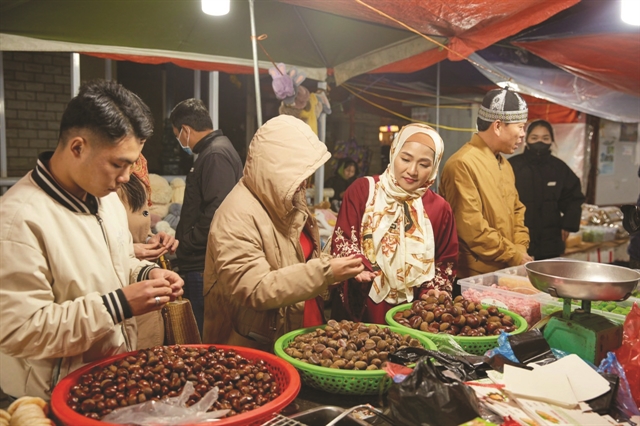 |
| MARKET DAY: Muslim tourists visit a local market in Sa Pa, Lào Cai Province. — Photo dulichvn.net.vn |
Partnerships and halal tourism potential
Through his recent visits, Prime Minister Chính elevated the Việt Nam-UAE relationship to a comprehensive partnership while deepening ties with Saudi Arabia and Qatar, which opens up more collaborative opportunities in various fields, including halal industry development.
This elevated partnership is expected to encourage tourism and economic exchange, enabling Việt Nam to expand its halal industry to welcome more tourists from the Gulf.
Việt Nam’s coordinated efforts—from government support to business adaptations and certification processes—signal a promising future for halal tourism in the country.
As a safe destination, Việt Nam holds significant potential to welcome an expanding Muslim tourist base with tailored services and halal-certified amenities that cater to both Muslims and non-Muslims interested in cultural experiences.
A thriving halal tourism ecosystem could emerge, driven by collaborative efforts from the government, private businesses, accreditation agencies, and the Vietnamese people, fostering a welcoming environment that meets the unique needs of Muslim visitors. VNS